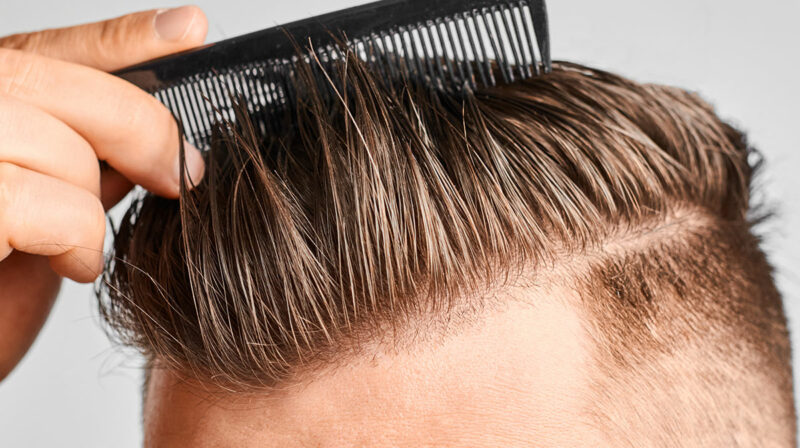Hair loss from creatine?
This article is verified by 3 studies/publications.

Time and again, people taking creatine report increased hair loss in the short or long term. For a while, there wasn’t any solid evidence linking creatine intake to hair loss. Personal experiences were often chalked up to intense workouts and related hormone changes.
A 2009 study[1] suggests that there could be a causal relationship, and that creatine may indirectly cause increased hair loss.
Too long; didn’t read (Summary)
- Hair loss caused by creatine? Yes, possibly – a study explains a potential connection between creatine consumption and hair loss.
- Currently, there are no other studies that have been able to reproduce this result.
- Hair loss is not directly caused by creatine, but by a changed hormonal balance in favor of DHT.
- Men with hereditary hair loss or a genetic predisposition to it may be susceptible.
Study: Creatine changes hormonal balance in favor of hair loss
At a sports institute in South Africa, 20 volunteer rugby players had their hormone levels monitored over three weeks.
For a week, participants either received 25 grams of creatine and 25 grams of glucose daily or, as a placebo, just 50 grams of glucose. After the first week, a maintenance dose of 5 grams of creatine and 25 grams of glucose was given, or 30 grams of glucose as a placebo.
Testosterone and DHT levels in the blood were measured at the start, after 7 days, and after 21 days. Serum testosterone levels didn’t change; however, DHT levels increased by 56 percent after 7 days and stayed 40 percent above baseline during the maintenance dose. The DHT:T ratio increased by 36 percent after 7 days and remained 22 percent higher during the maintenance dose.
Open questions about the study
While the study results are clear, some questions remain. Gary Green from UCLA published a response[2].
The most important question is the origin of the creatine supplement and prior testing, which isn’t addressed in the study. A contamination of the creatine used in the study can’t be ruled out.
The use of a larger amount of glucose as a placebo was also questioned. Green believes it would have been more sensible to administer the same amount of glucose to both test groups, rather than doubling it in the non-creatine group during the loading phase.
Response from the study authors
The question of the purity of the creatine used in the study is clearly addressed by the study authors. They state that the substance was tested for 25 different androgenic (and related) substances and other stimulants using gas chromatography and liquid chromatography coupled with mass spectrometry. There were no contaminants at a lower limit of 10 ng/g.
The criticism regarding differing glucose amounts is countered by the fact that this is similarly handled in other studies. Additionally, both creatine and glucose were administered in capsule form. By giving all participants the same number of capsules, the “placebo” amounts differed.
Summary
The initial criticism of the study, mainly concerning possible contamination, is justified. However, the response from the study authors provides good answers to the most pressing question, at least retrospectively. The creatine supplement used appears to have no anabolic-androgenic contaminants, so the changes in DHT levels can’t be attributed to that.
Hair loss due to DHT
These results indeed suggest a indirect influence of creatine on hair loss. It has been known for some time that DHT is significantly (co-)responsible for hereditary hair loss. Hair follicles are sensitive to the hormone and, through shortened growth phases over a longer period, produce increasingly shorter hairs. Accordingly, steroid-5α-reductase inhibitors such as finasteride are successfully used to treat hereditary hair loss.
Based on the study results, a causal relationship between creatine and hair loss is likely. The observations often expressed in various internet forums can at least be argued with.
However, this doesn’t mean that every creatine user must fear hair loss, as the DHT sensitivity of hair follicles varies individually. At least one should keep these relationships in mind and can also counteract hair loss with natural remedies.
Lastly, it should be mentioned that this is a single study. In another study on creatine malate[3], control groups and DHT levels are missing.
Sources
- Three weeks of creatine monohydrate supplementation affects dihydrotestosterone to testosterone ratio in college-aged rugby players. van der Merwe J1, Brooks NE, Myburgh KH. Clin J Sport Med. 2009 Sep;19(5):399-404. doi: 10.1097/JSM.0b013e3181b8b52f. URL: https://www.ncbi.nlm.nih.gov/pubmed/19741313, accessed on 03.06.2018.
- Creatine Supplementation and DHT:T Ratio in Male Rugby Players. Clinical Journal of Sport Medicine: May 2010 – Volume 20 – Issue 3 – p 220 doi: 10.1097/JSM.0b013e3181df5cad. Green, Gary MD. URL: https://journals.lww.com/cjsportsmed/Citation/2010/05000/Creatine_Supplementation_and_DHT_T_Ratio_in_Male.13.aspx, accessed on 03.06.2018.
- Effect of creatine malate supplementation on physical performance, body composition and selected hormone levels in spinters and long-distance runners. Tyka AK, Chwastowski M, Cison T, Palka T, Tyka A, Szygula Z, Pilch W, Strzala M, Cepero M. Acta Physiol Hung. 2015 Mar;102(1):114-22. doi: 10.1556/APhysiol.102.2015.1.12. URL: https://www.ncbi.nlm.nih.gov/pubmed/25804393, accessed on 03.06.2018